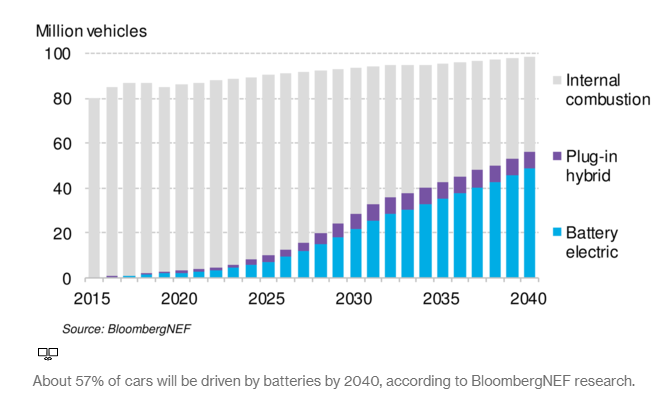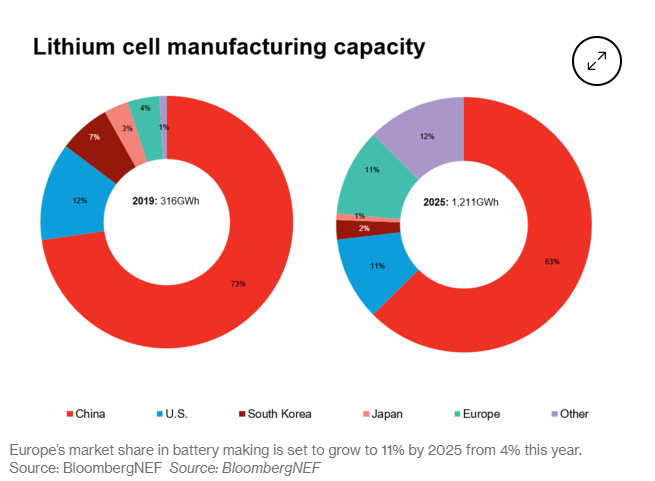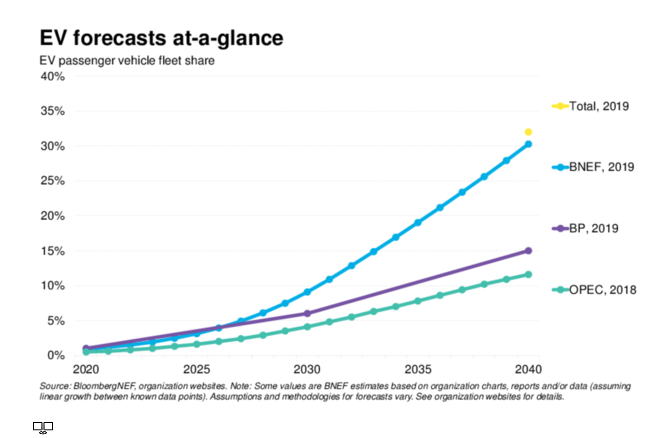The European Union is starting to act like China when it comes to building the batteries that will drive the next generation of cars and trucks.
In the past few months, government officials led by European Commission Vice President Maros Sefcovic have joined with manufacturers, development banks and commercial lenders on measures that will channel more than 100 billion euros ($113 billion) into a supply chain for the lithium-ion packs that will power electric cars.
Germany and France are prodding for action out of concern that China is racing ahead in new technologies sweeping the auto industry. With 13.8 million jobs representing 6.1% of employment linked to traditional auto manufacturing in the EU, authorities want to ensure that manufacturers can pivot toward supplying electric cars and batteries.
“We are walking the talk,” Sefcovic said in remarks to Bloomberg. “We have overcome an initial resignation that this battle would be a lost one for Europe.”
A number of trends are catalyzing the program, starting with the determination by EU nations to rein in greenhouse gases and fight climate change. They’re increasingly focused on reducing pollution from diesel engines and alarmed at the head start Chinese companies have in greener technologies. French President Emmanuel Macron in February said he “cannot be happy with a situation where 100% of the batteries of my electric vehicles are produced in Asia.”
Drive Trains Go Electric

So far, the EU’s program is starting to work and putting Europe on track to wrest market share away from China. By 2025, European companies that currently lack a single large battery maker will rival the U.S. in terms of capacity, according to forecasts from BloombergNEF. Measures that will spur investment include:
- France and Germany are working on measures to channel billions of euros into the battery industry. Sefcovic has said the EC may be able to embrace the state-aid proposal as a special project by the end of October. The two nations are seeking to draw in additional support from Spain, Sweden and Poland.
- The European Investment Bank gave preliminary approval in May to a 350 million-euro loan supporting NorthVolt AB’s bid to build a battery gigafactory in Sweden after the company completed a fund raising.
- The EIB along with the European Bank for Reconstruction & Development are working on a “raw materials investment facility” that will help to build a supply chain for rare Earth metals needed for batteries, according to Sefcovic who says he hopes the program will be launched by the end of the year.
- The EU in May started a 100 million-euro Breakthrough Energy Venturesfund with Microsoft Corp. founder Bill Gates and other investors to advance the energy transition, which is likely to include batteries.
- The EC has gathered at least 260 industrial companies including Peugeot SA, Total SA and Siemens AG in an alliance aimed at building capacity to make the energy storage devices in Europe.
“A year or two ago, everyone was under the impression that it was already too late for Europe,” said James Frith, an energy storage analyst at BloombergNEF in London. “But they’ve made a commitment, and Europe is in a strong position now.”
Read BNEF Note: Can Europe Rival Asian Battery Manufacturing
By 2025, Europe may control 11% of global battery cell manufacturing capacity, up from 4% now, according to Frith. That will pare back China’s market share and rival the U.S. command of the industry. The EC estimates the battery market may be worth 250 billion euros a year by then. It estimates at least 100 billion euros already has been committed to battery factories or their suppliers in Europe.

The goal is to build enterprises in Europe that could supply the region’s automakers without requiring imports from the major battery manufacturing centers in Asia. Currently, Contemporary Amperex Technology Co., or CATL, and BYD Co. dominate production in China. Elon Musk’s Tesla Inc. is also building battery gigafactories in the U.S.
So far, Europe has no established battery supply chain, though it has drawn investment in local factories from Korean firms including LG Chem Ltd. and Samsung SDI Co. as well as CATL.
The new ambition of the commission is to stimulate companies big enough to supply the likes of BMW AG and Volkswagen AG, which plan a massive increase in electric car production. Across the industry, the outlook is for a rising portion of cars to run on batteries in the coming years.

No single company will get the lion’s share of the investment or aid. Instead, dozens will benefit in addition to Peugeot and Total, which are building a cell plant in Kaiserslautern, Germany. Funds will also trickle into suppliers of parts or raw materials including Siemens, Umicore SA, Solvay SA and Manz AG.
Read BNEF Note: Europe Challenges China for Control of Battery Materials
Scarred by losing control of the solar industry in the last decade, Germany is leading the push. The nation was the biggest producer of solar cells in the early 2000s before Chinese companies backed by government loans took the lead.
When it comes to batteries, Economy and Energy Minister Peter Altmaier is focused on the 800,000 jobs in Germany tied directly to car manufacturing. Batteries account for about a third of the value of an electric car, and without facilities to make those in Europe, more jobs will go to Asia, Altmaier has said.
“There’s going to be huge demand in Europe for battery cells,” Altmaier said on ARD Television in June. “We must have the ambition to build the best battery cells in the world in Europe and Germany.”
Sefcovic envisions 10 or 20 “gigafactories” making battery cells across Europe and with his support the European Battery Alliance is seeking to coordinate research that will be the foundation of the plan. NorthVolt intends to be one of the major battery makers, feeding BMW and other major automakers.
“If we want to be one of the major manufacturers in Europe by 2030 we need to build about 150 gigawatt-hours of capacity,’’ said NorthVolt Chief Executive Officer Peter Carlsson. “The customer demand is so strong that we are accelerating our plans. We have taken a huge step on the way to create a new Swedish industry that will have a big impact in cutting our dependence of fossil fuels.’’
Source: https://www.bloomberg.com/news/articles/2019-07-03/europe-thinks-like-china-in-building-its-own-battery-industry
Comments are closed.






